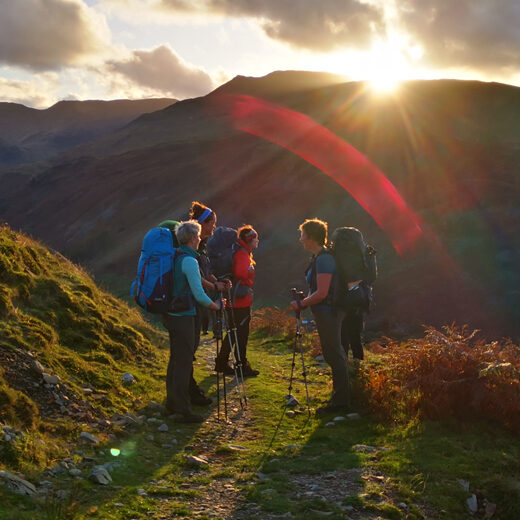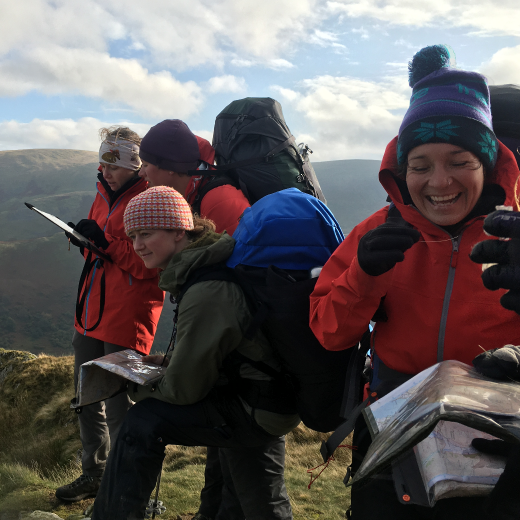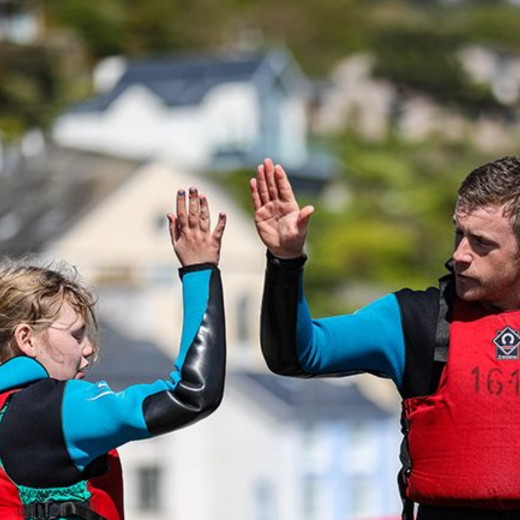Enabling factors for Women in Outdoor Leadership.
For a long time, the topic of barriers for women in the outdoors has been considered. Do barriers really still exist in 2020? If so, what are they? How can we break them down and enable more participation and leadership? Multiple academic studies spanning decades identify limiting factors for women participating in outdoor adventure and pursuing a career in outdoor leadership, yet there is still widespread variation in public opinion and engagement by people with the ability to drive meaningful change.
We thought it was time to dig a bit deeper. Time to take some action which would uncover real learning in this area, so that our female participants have more female role models, inspiring adventurous and aspirational lives.
In 2019 The Outward Bound Trust ran its first Women’s Outdoor Leadership Course. Eight women from a variety of backgrounds joined together for ten weeks of adventure and learning at The Trust’s Ullswater Centre. The course was designed for women between training and assessment of core National Governing Body Outdoor Leadership Awards, with a focus on psychology of potential, personal leadership and progressing the technical skills required to operate in mountain, rock and water environments.
It has become clear that something incredible and development enhancing happens when a group of motivated women get together, led by women, with an ethos of support and collaboration. With the rise of women only training courses, networks and events in the outdoors, there is clearly something positive happening. Emerging from this process now is perhaps a more useful question: What are the enabling factors of female led, female only spaces for women’s personal development?
Post course, there are several areas of interest standing out from the research data and experience we have gathered. The women involved report an increased sense of self confidence and belief in abilities, as well as an increased sense of possibility around making progress towards leadership qualifications.
“Just the idea of going out climbing and being able to do the assessments. That just always was like, I’m never going to be able to do that sort of thing, like really unachievable, and actually that week doing my first… learning to place gear, doing it whilst on a top rope and then being able to go and do my first trad lead… I’m going, I can do this. It is possible. I will be able to do it. And I think for me that’s probably one of the biggest achievements.”
“I’ve not really considered 4* (Canoe) before, I’ve been like “aah you know, whatever… aach, that’s really high up, that’s for people who lead white water.” And then we led white water! And I was like, ah ok, not as inaccessible.”
“Now I feel like the ropework stuff for ML is no longer like this big enigma, I’m like yeah I think I could do that and like setting up an anchor is no longer a big thing – you just have to go and do it.”
Of course, with any training environment you would expect progression and learning to take place. What we were particularly interested to discover were the elements of this which were enhanced by this being specifically a Women’s Course. There are three themes that stand out here:
Female Leadership
For some of the women on the course, this was the first time working with a female leader in the outdoors. Being led, taught, coached and developed by women further on in their career, who had lived the qualification journey and been successful was highlighted as a powerful motivator. Some of the participants felt a sense of “that could be me one day”, for others it was more about the shared understanding that stemmed from similar experiences leading to enhanced relationships and ability to be more real, more quickly.
“Just one thing that I think was, to an extent, quite important, is that the people that were running it were female. So, I feel like they have, every step of the way, understood how we’ve all felt.”
Female Peers
The group had varied experiences and perceptions of female only spaces, for some it was new, several applied for the course for this reason, others were sceptical yet curious. By the end everyone agreed that the female only environment had been hugely positive, sometimes surprisingly so.
Being surrounded by other women meant there were certain conversation topics which came up more naturally (such as managing periods in the outdoors), creating a relaxed atmosphere around things which can sometimes go undiscussed or remain hidden in mixed gender environments.
For some participants adventuring with other outdoor women was pretty novel and so meeting other like-minded women was hugely significant. This provided both inspiration and a network of “people like me” to progress with.
“And so I suppose it’s taking inspiration, as well, from the women around you who also are feeling the same way. But, actually, you can sort of see a bit of yourself in the people around you. And it’s quite a nice thing to be able to see.”
Being in male dominated environments and hearing certain qualifications talked up by colleagues led to them being put on a bit of a pedestal. Being amongst competent females contributed to building up a more realistic and achievable view of the skills required.
There was also a feeling of beginning on equal footing.
“We’ve felt less like we had to prove ourselves. Especially being a woman in the outdoor industry, you quite often feel that you’ve got to... You’ve got to be top of the game. And I don’t like to show weakness or vulnerability. And you’ve got to just be proving yourself and at the top of your game all the time. But here it’s most definitely been an environment where, partly because it is all women, where you can... Be quite open and honest about your weaknesses and your vulnerabilities. I think that would’ve been harder on a mixed gender course.”
Feeling like an equal in the group, coupled with the supportive environment gave way to a learning environment where people were able to be completely open about where they were at, meaning they were able to get the input and support required to quickly progress rather than exerting energy at maintaining a “top of my game” face. Some participants also described how feeling like an equal made it easier and more natural to step up to new challenges rather than deferring to someone else (often a male) deemed to have more knowledge or expertise in particular areas.
Course Ethos – Improving, support and collaboration
The course was intentionally set up to value improving yourself, rather than proving what you can already do. Support, collaboration and authenticity were encouraged from the start. Many participants experienced this as different from other contexts they’d been part of in the outdoors.
The research so far suggests that this course environment enabled people to challenge themselves more than would’ve been comfortable in other contexts, leading to more learning and development.
I do think the positive environment gave way to us being able to be advocates for ourselves. Like at the start of the week they said, well what do you want out of it? And I was able to say “Yeah, I wanna to do my first lead climb.” And then we did. You know so it was very much that you could say something that you perhaps wouldn’t have said in another environment. I’d probably have been like “oh you know, maybe just practice some stuff…” downplay it, and in my head be like “it’d be cool to do my first lead climb but maybe not here…”
The valuing of the learning process was also mentioned as an enabling factor in progression. This was contrasted with other settings where participants had experienced more of a “just get on and do it” approach. It was identified that in such settings it can be harder to be honest about where you’re at because there’s a certain expectation, and not enough time given to allow honesty and open conversation. Valuing the process, as much as the outcome and having individualised goals which were supported by the group appeared to enhance learning.
“Its very person centred, everything. From day one to now it’s all about well, what do you want to get out of this and what can we do to support that. So you know even just by making us think in the first week what our specific goals were you know, you put that onus onto us of actually what do I want to achieve here, and then speaking to the mentors and going into week 2 and week 3 and doing the psychology of challenge and resilience and all of that and the stuff on potential, makes you think all the time so you are more open to be like, “this is what I need, this is what I want.”
It is possible to recreate the three areas of female leadership, female peers and an ethos of support and collaboration separately, and there are lessons to take from all aspects. What has become clear to us is the power of a learning environment for women which has all of them together.
Concluding Thoughts
As the conversation around women’s courses evolves, it has been fascinating to consider the range of opinions. What has struck me is how frequently and immediately women’s courses are associated with weakness, reduced levels of challenge or being for those who “can’t quite cope” in mixed gender environments. Experience and listening to the words of the women who took part in last years course, suggests that this is absolutely not the case. These women are capable, and keen to keep developing themselves and others. They found motivation and insight from working with other capable female leaders. Inspiration was drawn from each other’s strength, determination, creativity and willingness to be open and real even when that was tough. The learning environment that was co-created opened up possibility and enabled people to nudge at the edges of their current capabilities, improving skills and making progress towards goals which previously felt unattainable. The subtleties of the environments in which we operate can limit or enable, sometimes outside of our conscious awareness. We are excited to be offering an environment which can act as a catalyst for women’s development as leaders of the next generation in outdoor adventurous learning.
Further Reading

Travelling to equality
14 November 19
The journey to a Women's Outdoor Leadership Course

A Career in the Outdoors: Not for me?
11 December 19
Find out what it takes to become a great female leader at Outward Bound.

The Importance of Equality at Outward Bo...
12 December 19
Instructor and mentor Nick shares his experience of equality at Outward Bound
Find out how to join our 2024 Women's Outdoor Instructor Development Programme
Apply to join us for 10 weeks of adventure and learning at our Loch Eil Centre, starting 16 September to 22 November 2024
How we're addressing diversity in the outdoors
Role models matter to the young people we work with. So we want to have an instructional team which is representative of the young people we work with.